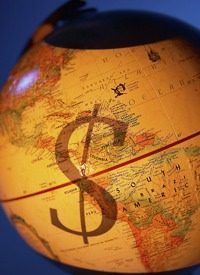
"We will refrain from competitive devaluations of our currencies and promote a stable and well-functioning international monetary system," G-8 leaders pledged in a clear reference to the U.S. dollar, a declaration also signed by Brazil, China, India, Mexico, South Africa, and Egypt. European and Asian currencies have struggled to depreciate their fiat currencies in pace with the rapidly inflating dollar over the past year.
French President Nicolas Sarkozy openly advocated dumping the dollar as the international currency reserve, stating flatly that "we cannot stick with just one single currency." Russian President Dmitry Medvedev evidenced the same hostility to the dollar, unveiling a prototype of an international currency at the summit. "In all likelihood something similar could appear and it could be held in your hand and used as a means of payment," he told G-8 reporters. "This is the international currency."
While Russia has long bristled under the dollar, Sarkozy’s opposition was new. "Even if it’s a difficult topic, I hope that in the coming months we will talk about currencies and the international monetary system," Sarkozy said. "There has to be a debate."
But the two nations hardly stood alone in advocating the inflationary dollar being dumped as the global reserve currency. “Leaders from Brazil, Russia, India and China are demanding a greater stake in the management of the global economy and challenging the dollar as the primary denomination for world reserves,” Bloomberg.com wrote after the summit. The BRIC (Brazil, Russia, India, and China) nations are large nations with huge populations, nearly 50 percent of global population and some 15 percent of global economic output. And they have been increasingly vocal against the U.S. dollar. Leftist Brazilian President Luiz Inacio Lula de Silva went on a tirade at the summit about how "white, blue-eyed" people had caused the economic crisis.
Since China is the largest holder of U.S. currency reserves, it’s easy to understand Chinese anger at the rapidly inflating dollar. It’s costing them billions of dollars every day in lost value. “China has particular cause to worry that America’s massive printing of money in response to the financial crisis will undermine the value of its dollar reserves,” the British magazine The Economist reported. “There is much domestic anger about the potential losses China may face as a result of its lending to rich Americans. The government would like to diversify out of dollars: its new purchases of Treasury securities have fallen sharply this year. But any attempt to dump its stock of dollars would risk triggering a plunge in the currency. Instead, officials are mulling two ways out of the ‘dollar trap’: persuading the world to adopt a new global currency and encouraging the international use of the yuan.”
Back in March, the president of China’s central bank proposed an international currency reserve patterned on the International Monetary Fund’s Special Drawing Rights (SDR) means of holding reserves.
At the G-8 summit, Chinese officials were officially supportive of the dollar, but the Chinese government’s news service Xinhua explained that “Chinese Vice Foreign Minister He Yafei said here on Sunday that the United States has the responsibility to maintain the stability of U.S. dollar.”
Meanwhile, Venezuelan President Hugo Chavez has been campaigning for months with OPEC members for a new oil-based currency.
Thus, it shouldn’t be any surprise that U.S. Treasury Secretary Timothy Geithner’s next stop after the G-8 Summit was a tour of OPEC nations. “U.S. Treasury Secretary Timothy Geithner reached out to Gulf Arab leaders Tuesday,” the Associated Press reported July 14, “stressing to some of America’s top creditors that his country has a ‘special responsibility’ to steer the world through a global recession that may finally be showing signs of easing.” Oil-rich Arab nations collectively hold more U.S. dollar reserves than any nation other than China.
"This is a visit to really re-emphasize U.S. leadership and U.S. pre-eminence in the world economy even in the midst of this global downturn," Tarik Yousef, dean of the Harvard-affiliated Dubai School of Government, told the Associated Press. "The last thing the U.S. wants is for people to lose confidence in its policies and its currency."
Apparently, it’s a little too late for that.


